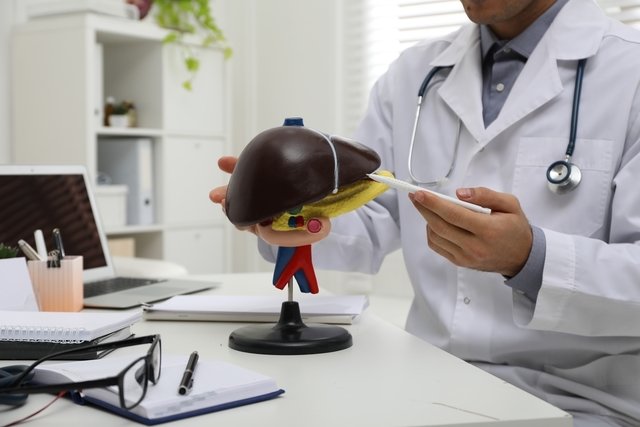Hepatitis is inflammation of the liver that, in most cases, is caused by viruses, but it can also occur as a result of the indiscriminate use of medications, excessive consumption of alcoholic beverages or due to an autoimmune disorder.
The most common types of hepatitis are those caused by viruses, mainly hepatitis A, B and C, which can cause symptoms such as yellowing of the skin and eyes, fever, tiredness, headache, diarrhea, nausea and general malaise.
Read too: 10 symptoms of hepatitis (and how you catch it)
It is important to consult a general practitioner, hepatologist or gastroenterologist as soon as the first symptoms indicative of hepatitis appear, as this allows the diagnosis to be confirmed and the most appropriate treatment to be initiated, if necessary. Learn more about the types of viral hepatitis in the following video:
Hepatitis symptoms
The main symptoms of hepatitis are:
- Headache ;
- General malaise;
- Abdominal pain and swelling;
- Yellow skin and eyes;
- Dark urine;
- Clear stools;
- Nausea and vomiting;
- Weight loss without apparent cause.
Hepatitis symptoms can vary according to the cause of this condition, and there may be more or fewer symptoms of different intensities.
Online symptom test
To find out if you have hepatitis, select the symptoms shown in the following test:
This symptom test is only a guidance tool and does not serve as a diagnosis or replace consultation with a hepatologist, gastroenterologist or general practitioner.
How the diagnosis is made
The diagnosis of hepatitis must be made by a hepatologist, gastroenterologist or general practitioner by evaluating the signs and symptoms presented by the person and the results of laboratory tests that evaluate the functioning of the liver, such as TGO, TGP, bilirubin and lactate dehydrogenase. Find out more about the tests that evaluate the liver.
In addition, the doctor may also order imaging tests, such as computed tomography and magnetic resonance imaging, as well as a serological test to identify the presence or absence of the virus.
Make an appointment with your nearest doctor to assess the possibility of hepatitis and, if necessary, start the most appropriate treatment:
Taking care of your health has never been easier!
Types of hepatitis
The types of hepatitis, which vary depending on their cause and mode of transmission, are:
1. Hepatitis A
Hepatitis A is caused by the hepatitis A virus (HAV), which causes inflammation of the liver and can cause symptoms such as tiredness, low fever, yellow eyes and skin, nausea, headache and stomach pain, for example. Check all the symptoms of hepatitis A.
Infection with the hepatitis A virus occurs mainly through consumption of contaminated water and food. Furthermore, hepatitis A can also be transmitted through unprotected sexual contact with an infected person.
2. Hepatitis B
Hepatitis B is a disease caused by the HBV virus, which is transmitted when blood, semen or other bodily fluids from an infected person enter the body of a healthy person. Understand better how hepatitis B is transmitted.
Thus, hepatitis B can be transmitted through unprotected sexual contact, sharing needles or syringes, or from an infected mother to her baby during pregnancy or childbirth, for example. The symptoms of hepatitis B are similar to hepatitis A.
3. Hepatitis C
Hepatitis C is caused by the HCV virus, which is transmitted through blood, and can happen through sharing syringes and needles used to get tattoos, or administering injectable drugs, sharing personal hygiene items, such as a razor or toothbrush , or unprotected sexual contact.
4. Hepatitis D
Hepatitis D is caused by the HDV virus, causing symptoms such as fever, easy bleeding, mental confusion and yellowing of the skin and eyes. Know all the symptoms of hepatitis D.
This type of hepatitis usually arises in people with hepatitis B because the HDV virus uses the cell surface antigen of the hepatitis B virus to multiply and infect liver cells.
5. Hepatitis E
Hepatitis E is an inflammation caused by the HEV virus, causing acute or chronic hepatitis and generally causing no symptoms. However, it can cause symptoms such as low-grade fever, loss of appetite, nausea or abdominal pain.
The HEV virus can be transmitted through drinking contaminated water, eating undercooked meat or from a pregnant woman to her baby, for example.
6. Hepatitis F
Hepatitis F is a subgroup of hepatitis C. However, the hepatitis virus has not yet been identified in humans and, therefore, this type of hepatitis is not relevant.
7. Hepatitis G
Hepatitis G is caused by the HGV virus and is generally found in people diagnosed with hepatitis B, hepatitis C or HIV. Hepatitis G can be transmitted through contact with contaminated blood, in unprotected relationships, sharing syringes or blood transfusions, for example.
8. Autoimmune hepatitis
Autoimmune hepatitis is a genetic disease caused by an error in the immune system where antibodies attack healthy liver cells, causing inflammation and causing symptoms such as itchy skin, stomach pain, joint pain and loss of appetite. Understand better how autoimmune hepatitis happens.
9. Medicated hepatitis
Drug-induced hepatitis is inflammation of the liver caused by medications, especially when used excessively or without medical advice. The main medications that can cause this type of hepatitis are those capable of causing liver irritation, such as paracetamol or nimesulide.
10. Alcoholic hepatitis
Alcoholic hepatitis is caused by prolonged and excessive use of alcoholic beverages, causing symptoms such as abdominal pain, nausea, vomiting and loss of appetite, for example.
11. Chronic hepatitis
Chronic hepatitis is inflammation of the liver that lasts more than 6 months and can cause the development of cirrhosis or liver failure and, depending on the severity of the lesions, a liver transplant may be necessary. Learn more about chronic hepatitis.
12. Fulminant hepatitis
Fulminant hepatitis is severe inflammation of the liver in people who have a normal liver or controlled liver disease in which the liver ceases to be functional, which can lead to death within a few days.
Main causes
The main causes of hepatitis are:
- Infection by viruses, mainly hepatitis viruses A, B, C, D, E and G;
- Uncontrolled use of medications;
- Excessive consumption of alcoholic beverages.
Furthermore, hepatitis can also occur as a consequence of other diseases, such as lupus, Sjögren’s syndrome, cystic fibrosis, inflammatory bowel disease, hemolytic anemia, rheumatoid arthritis, scleroderma or glomerulonephritis.
How transmission happens
The main forms of transmission of infectious hepatitis are:
- Contact with contaminated blood;
- Consumption of water and food contaminated by the virus;
- Sharing syringes and needles
- Sexual intercourse without using a condom;
- Use of non-sterile materials to make tattoos, piercings or to do your nails, for example.
Other less common forms of transmission are blood transfusion and transmission from an infected mother to her child, through pregnancy or childbirth.
How the treatment is carried out
In addition to rest and hydration, treatment for hepatitis may also include a balanced diet, abstinence from alcohol, use of medications and, in some cases, liver transplantation.
1. Medicines
Medications such as interferon, tenofovir, ribavirin and entecavir can be prescribed by the doctor to prevent the viruses from multiplying in cases of hepatitis B, C, D, E and G.
In the case of autoimmune hepatitis, the medications recommended by the doctor include corticosteroids, such as prednisone, or immunosuppressants, such as azathioprine.
These medications can cause side effects such as joint pain, headache, and fever. Therefore, many people may abandon treatment, compromising the treatment. Despite this, these symptoms are more common at the beginning of treatment and tend to decrease with the use of analgesics, antidepressants or anti-inflammatories.
2. Alcohol withdrawal
Abstinence from alcohol, or stopping consuming alcoholic beverages, is essential in the treatment of hepatitis, as this improves inflammation in the liver, helping to cure hepatitis.
3. Diet
In the hepatitis diet, it is important to prioritize the intake of healthy foods, such as lean proteins, fruits, vegetables, legumes, whole grains and legumes, which are rich in vitamins, antioxidants and other essential nutrients to help liver recovery. Understand better what the hepatitis diet should be like.
During the hepatitis diet, it is also recommended to reduce the consumption of fried foods, packaged snacks, cookies and ice cream. This is because during hepatitis, the production of bile salts, substances that participate in the digestion of fats, is reduced.
Check out the following video for more on what to eat during hepatitis treatment:
4. Liver transplant
Liver transplantation is a surgery in which the diseased liver is replaced with part or the entire liver of a healthy person. It can be indicated for people with any other type of hepatitis in an advanced stage that does not improve with treatment or that progresses to liver failure and cirrhosis.
Is hepatitis curable?
Most types of hepatitis are curable when the person is initially diagnosed and treated appropriately. However, when a person does not follow the treatment correctly, hepatitis can progress and can cause death.
Read too: How to cure hepatitis A quickly
Hepatitis D and autoimmune disease have no cure, as there are still no medicines that are capable of combating these types of disease, but only controlling them.
How to prevent hepatitis
Some tips to prevent hepatitis are:
- Get vaccinated against hepatitis A and hepatitis B;
- Use condoms in all sexual relations;
- Wash foods that will be consumed raw with treated, chlorinated or boiled water;
- Do not share syringes and needles;
- Wash your hands before and after going to the bathroom, before preparing meals and eating.
Furthermore, it is also important to avoid sharing personal items, such as razors, toothbrushes, manicure and pedicure supplies, and equipment for tattooing and piercing.

Sign up for our newsletter and stay up to date with exclusive news
that can transform your routine!
Warning: Undefined array key "title" in /home/storelat/public_html/wp-content/plugins/link-whisper-premium/templates/frontend/related-posts.php on line 12
Warning: Undefined array key "title_tag" in /home/storelat/public_html/wp-content/plugins/link-whisper-premium/templates/frontend/related-posts.php on line 13




